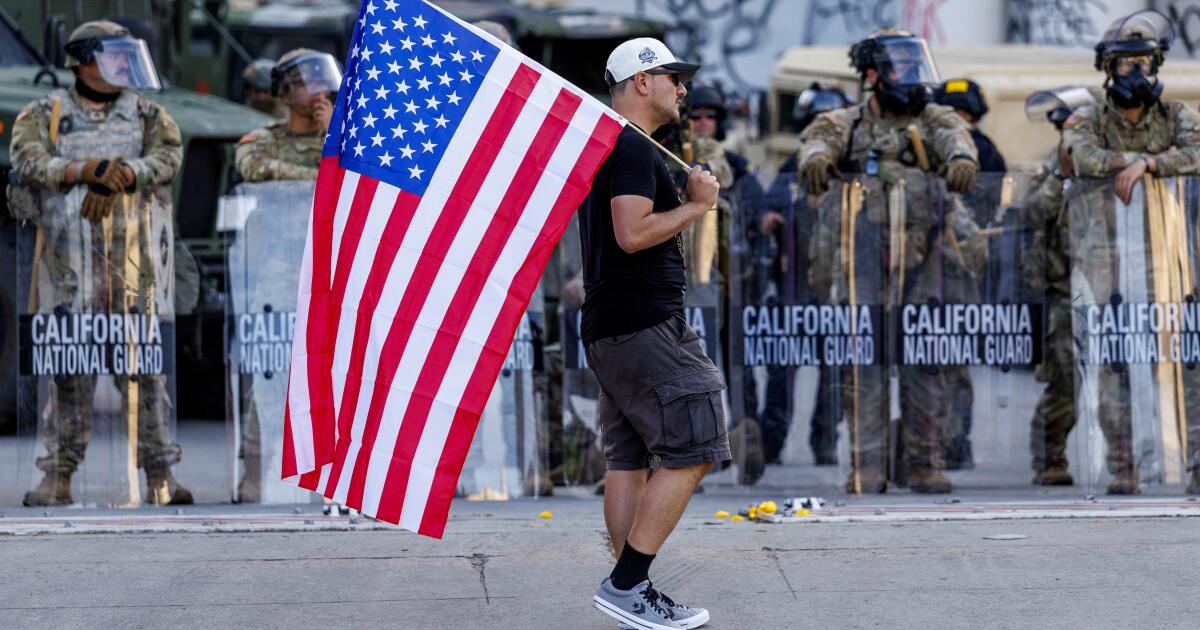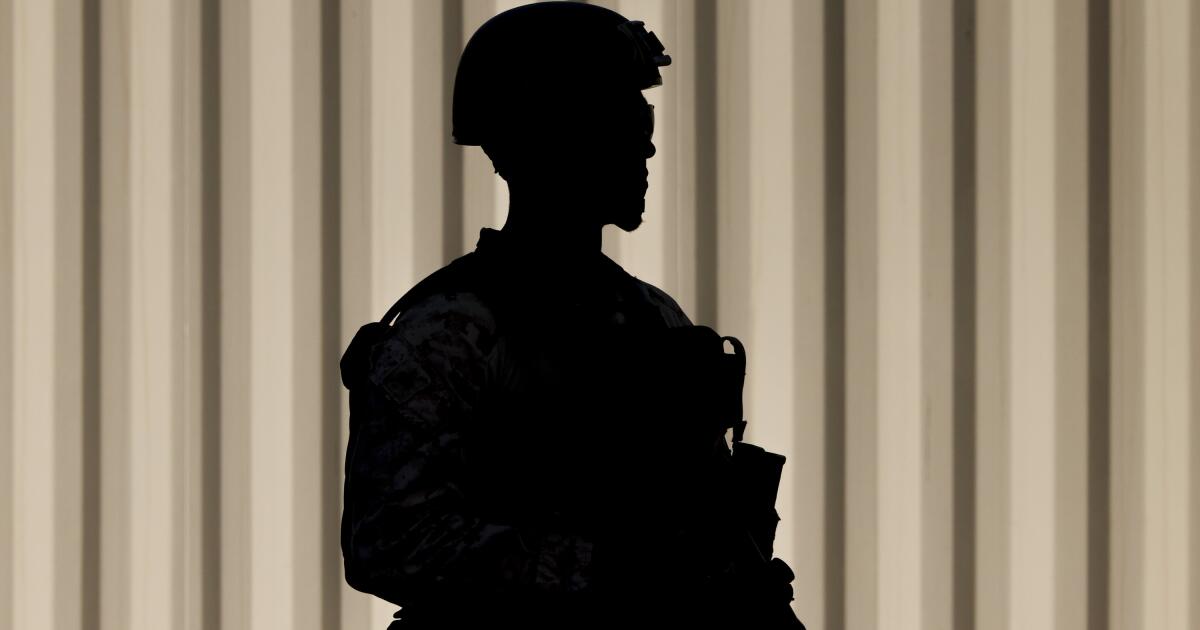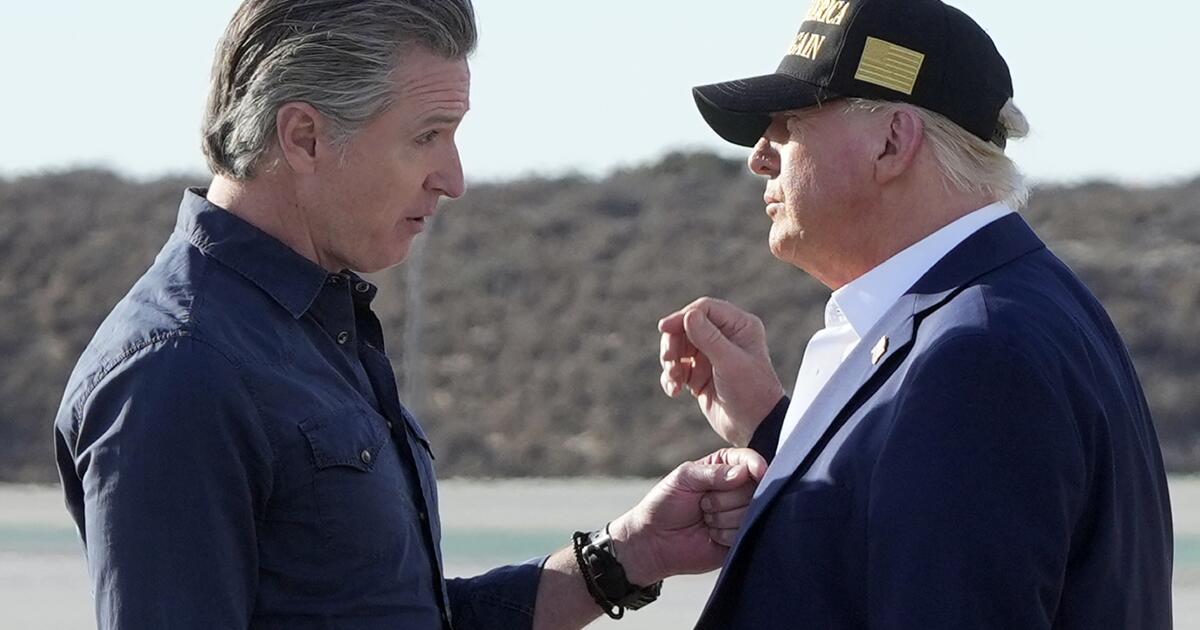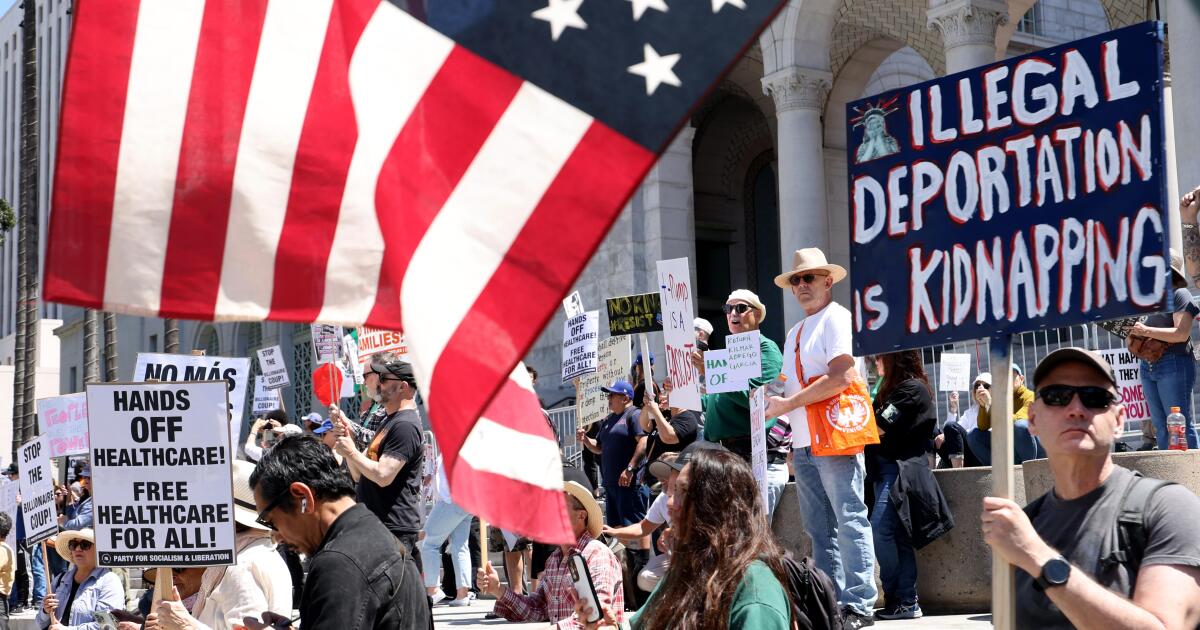President Trump dropped an executive order this week about “sanctuary cities,” of which California has many.
Not to mention we are a sanctuary state.
Alone, that order should grab the attention of cities such as Los Angeles, San Francisco and Sacramento, where the commitment to protecting our immigrant neighbors, regardless of documentation, is strong.
But stack it with a few other recent Trump moves, and we have what promises to be a summer filled with dissent, fear and a flurry of military maneuvers, questionable arrests and attempts to hobble efforts to protect immigrants, documented or not.
At the nexus of these efforts by the administration is a push to centralize ever-greater power at the federal level, never mind that Republicans have long been the standard-bearers for the federalist principle of states’ rights. Remember all those 1776 patriots who have suddenly gone silent? “Don’t tread on me” has morphed from a MAGA war cry to a Democratic plea.
“We’re still a federal state, and that means that there are powers that are given to the federal government in D.C. and powers that are given to states and localities,” Ross Burkhart told me. He’s a political science professor at Boise State University who studies patterns of democracy. “I worry about the balance being tipped toward a heavily centralized state.”
First, there’s Trump’s executive order from April 11 that hasn’t made too many ripples, despite being a bonkers expansion of military authority over civilians. Trump turned over from the Interior Department to the Department of Defense a swath of land at the southern border that crosses three states — California, Arizona and New Mexico — known as the Roosevelt Reservation.
That 60-foot-wide strip is now considered part of Ft. Huachuca, though the Arizona military base is in reality 15 miles away. No matter. The Roosevelt Reservation is now patrolled by military personnel, and entering it is considered trespassing on a military base — a criminal act.
The overt premise of this unusual military takeover is to detain those crossing the border illegally.
But what happens if a U.S. citizen crosses into that zone without permission? Maybe protesters, for example? Or aid workers, the kind who bring water to the desert?
They too could be subject to military detention.
Of course, federal law, in the form of the Posse Comitatus Act, forbids the use of the military for civilian law enforcement. Elizabeth Goitein, senior director of the Liberty and National Security Program at the Brennan Center, a nonprofit law and public policy institute, called the act “an absolutely critical protection for our freedoms and our democracy.”
Its single sentence reads: “Whoever, except in cases and under circumstances expressly authorized by the Constitution or Act of Congress, willfully uses any part of the [armed forces] … to execute the laws shall be fined under this title or imprisoned not more than two years, or both.”
That sentence was originally written as a compromise to remove federal troops from the South during Reconstruction after the Civil War. Those troops had been protecting Black voters. But a disputed presidential election threatened stability, and so a deal was struck with still-angry white Southerners that soldiers couldn’t be used to enforce civil laws — thereby removing the largest impediment to the Jim Crow era, but also putting that critical protection in place that prevents the military being used to suppress citizens. A doubled-edged sword with profound consequences.
The Posse Comitatus Act in the most simplistic of terms eventually led to the rebellion that was the civil rights movement, and subsequent laws that have pushed for equality and equity. That in turn has led us to this moment, when the powers that be are seeking to undo those gains.
Which brings us to the “except in cases and under circumstances” part of the Posse Comitatus Act, a Trumpian loophole if ever one was written.
If Trump’s first 100 days have proved anything, it’s that anything is on the table. Take the Insurrection Act, for example, another piece of loophole-filled law Trump has recently mentioned with interest.
Imagine, for example, if sanctuary cities were deemed to be violating federal law. If their leaders were accused of harboring and helping undocumented fugitives who somehow made it past the Roosevelt Reservation, or protests in the street were deemed violent rebellions.
In his executive order Monday titled “Protecting American Communities from Criminal Aliens,” Trump hinted at such scenarios.
“Yet some State and local officials nevertheless continue to use their authority to violate, obstruct, and defy the enforcement of Federal immigration laws,” it reads. “This is a lawless insurrection against the supremacy of Federal law and the Federal Government’s obligation to defend the territorial sovereignty of the United States.”
That sounds a lot like the Insurrection Act getting ready to leap through the Posse Comitatus loophole.
The order then suggests that some state and local officials could even be in violation of the Racketeer Influenced and Corrupt Organizations Act, most commonly used against organized criminal enterprises such as the mafia, and promises to “pursue all necessary legal remedies and enforcement measures to end these violations.”
“The thing about the Insurrection Act is that it is intended to be used only in very extreme, severe emergencies where there’s an immediate and overwhelming threat to public safety or to constitutional rights that the state and local authorities cannot or will not address,” Goitein said. “Unfortunately, the actual text of the law is much broader and so it is vulnerable to being exploited by a president who is unconstrained by norms.”
The same day, Trump also signed another executive order, “Strengthening and Unleashing America’s Law Enforcement to Pursue Criminals and Protect Innocent Citizens,” which instructs the Defense and Justice departments to “determine how military and national security assets, training, non-lethal capabilities, and personnel can most effectively be utilized to prevent crime.”
Taken together, those orders are a huge expansion of the federal powers of policing, a move toward a “security state” where the president could have the ability to enforce martial law, and arrest or detain anyone who opposes him.
Although the idea of arresting politicians, activists or even everyday folks still seems a surreal bit of exaggeration, it has already happened.
Milwaukee County Circuit Judge Hannah Dugan was arrested by FBI agents last week, charged with obstruction of justice and concealing an individual to prevent an arrest.
Well-known social justice activist the Rev. William Barber was arrested with other religious leaders while praying in the U.S. Capitol Rotunda on Monday, as part of a protest against Republican budget cuts.
An Oklahoma woman and her daughters, all U.S. citizens, were rousted from their beds in the middle of the night last week, in their underwear and at gunpoint, by federal authorities (who refused to identify themselves) looking for undocumented immigrants.
And Stephen Miller, the Santa Monica native and Trump immigration architect, had this to say after Illinois Gov. JB Pritzker called for peaceful protests against Trump’s authoritarian moves: “His comments, if nothing else, could be construed as inciting violence.”
Maybe the type of “violence” that leads Trump to invoke the Insurrection Act?
Although a hot Trump summer is on the horizon, Goitein said she has hope that people will push back successfully.
She points out that although Trump does not seem to care about crossing boundaries, he does care about his image. Currently, his popularity in polls is tanking and he is persona non grata on the international stage. The pressure, and power, of nonviolent protests may still keep this administration from treading on democracy.
The people, Goitein said, are not helpless.
“We are not there yet,” she said. But things are heating up.



